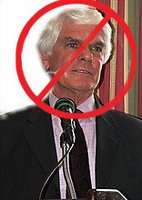 The GOP Culture of Corruption just keeps getting bigger.
The GOP Culture of Corruption just keeps getting bigger.Lets all give the newest member, Congressman Jerry Lewis, a warm round of applaus:
Federal investigators are examining the activities of several members of the House Appropriations Committee, including Rep. Jerry Lewis, chairman of the panel that wields broad influence over government spending, government officials said Thursday.
Lewis is a Republican who represents Desert Hot Springs.
The officials said the inquiry is focused on the relationships among lobbyists, contractors and committee members who seem to steer lucrative government contracts to favored vendors virtually free of outside oversight through a process known as earmarking.
The officials, who had been briefed on the investigation, were granted anonymity so that they could speak more candidly about a case that remains under federal investigation. They cautioned that the inquiry is preliminary and has not yet established specific evidence of wrongdoing by Lewis or by others. The officials declined to identify any other lawmakers under scrutiny.
Lewis, whose involvement in the inquiry was first reported by The Los Angeles Times on Thursday, issued a denial of any wrongdoing in which he said he had adhered to strict ethical standards in all his decisions on the committee. He said he knew nothing about the inquiry.
"Neither I nor any of my staff has been contacted by the Department of Justice with regard to an investigation into my congressional service," Lewis said in a written statement. "I have never, under any circumstances, told or suggested to someone seeking federal dollars for a project that they would receive favorable treatment by making campaign contributions."
The government officials said that investigators have not found records documenting contract awards that may have been influenced by individual lawmakers. Moreover, they said practices that appear to be improper might prove to be allowable under congressional procedures.
The investigation is an expansion of the inquiry that began with the guilty plea of Randy Cunningham, a former Republican House member from California known as Duke, who was a member of the committee.
Cunningham pleaded guilty in November and was sentenced to more than eight years in prison for accepting at least $2.4 million in cash and gifts in return for helping friends and supporters win defense contracts. Prosecutors have said in court filings that one of the contractors who paid bribes to Cunningham is Brent R. Wilkes, whose document processing company, ADCS, won nearly $100 million in Pentagon contracts in part through the intervention of Cunningham. The Appropriations Committee directed the Pentagon to award contracts to ADCS, which stands for Automated Document Conversion Systems, even though the Pentagon did not request funds for the service.
One of Wilkes' lobbyists in Washington was Bill Lowery, a former congressman from San Diego who is personally and politically close to Lewis.
Lowery also lobbied for a number of defense companies and local governments, including Riverside County, which received federal contracts with the help of Lewis. Lowery could not be reached for comment.
Additionally, a number of former Lewis employees went to work for Lowery's firm since 1999, including Leticia White, Jeffrey Shockey and Alexandra Heslop. Shockey returned last year to work for Lewis on the staff of the House Appropriations Committee.
In January, the group Citizens for Responsibility and Ethics in Washington filed a complaint with the Justice Department against Lewis to investigate the relationship.
But Lewis denies any relationship between his recommendations of projects for federal funding and campaign contributions, and he says that programs are weighed on their own merits. The city of Needles has received millions of dollars in transportation projects and never used a lobbyist, Lewis spokesman Jim Specht said.
"Chairman Lewis has a very stringent rule that he follows and he expects his staff to follow - that no project gets favorable treatment based on who the lobbyist is that represents it," Specht said.
Apparently John Boehner and the Republicans didn't believe people when they told them they wanted ethics reform in Washington.
That was evident in the weak reform bill they put forth.
They will find that out the hard way when they lose both houses of Congress.

